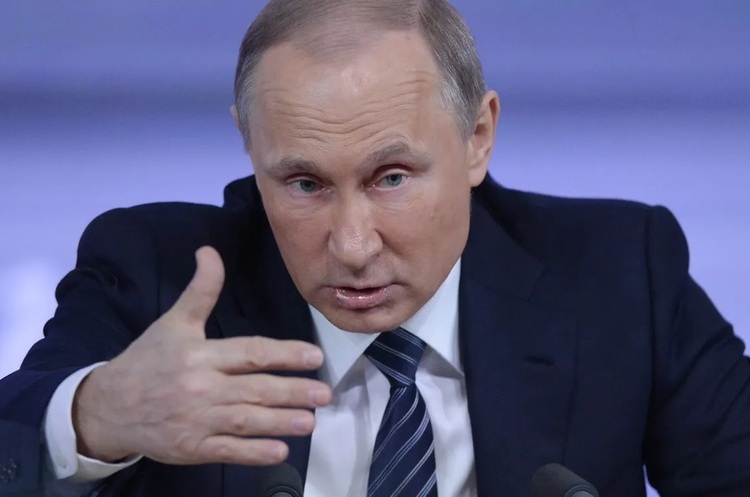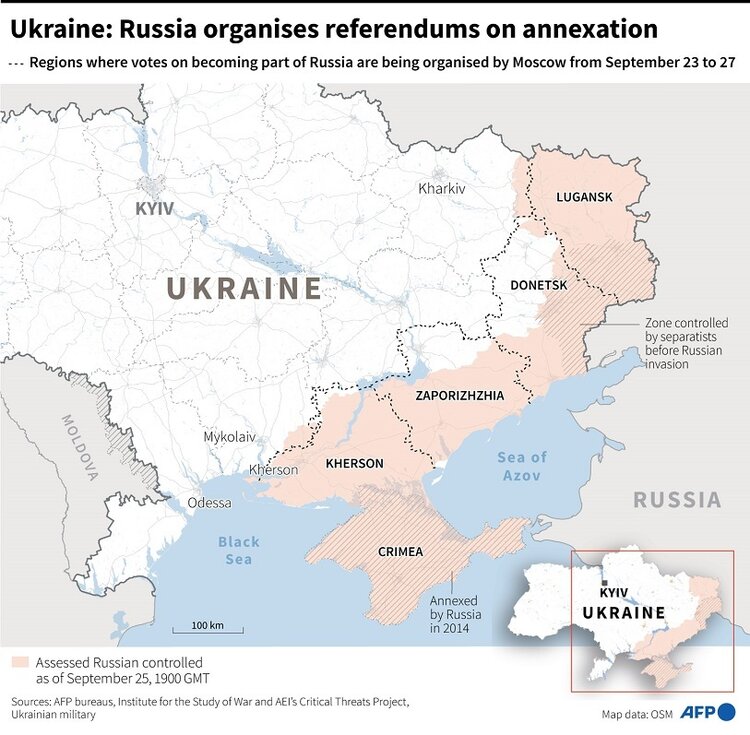putin "crossed the Rubicon": Why Moscow needs to annex four oblasts of Ukraine
Experts explained how Russia is raising the stakes in negotiations with the West

Today, on September 30, the Kremlin solemnly signed "agreements" on the incorporation of the territories of Donetsk, Lugansk, Kherson and Zaporizhzhia oblasts into Russia, where pseudo-referendums were hastily organised. This step will change the course of the war, analysts believe.
Desperate attempt to "tame the West"
“There is no doubt that Russia has crossed the Rubicon. The recent annexation referendums are meant to show the West that Russia has no intention of backing down from its political and military objectives in Ukraine despite recent setbacks,” cites Al Jazeera a comment by Konstantin Zatulin, putin’s United russia party MP.
Experts call the rapid holding of "referendums" in four oblasts a desperate move, as the Russian army does not fully control any of these provinces. Moreover, in Donetsk Oblast, Putin's troops are suffering crushing defeats and on 30 September, the day of the "referendum" celebrations, they were surrounded in the area of Lyman-Yampil.

Today's recognition of these fake votes – as well as the planned celebratory concerts and rallies in Moscow and the occupied territories – cut off the path to a peaceful settlement of the conflict. To recap, President of Ukraine Volodymyr Zelensky previously warned Putin that negotiations with Russia would become impossible after the referendums in the occupied Ukrainian territories.
“In the face of external pressure, putin usually raises the stakes instead of taking a step back or offering concessions. Having incorporated the Ukrainian territories into russia, he closed off some options for retreat, but we’re talking about Russia’s fight to secure its existence and place in the world against efforts to divide and inflict irreparable damage against us.” quotes Al Jazeera Konstantin Zatulin as saying.
Referendum against common sence
The "referendums" were announced and held very quickly – within two weeks – under the supervision of the occupation troops and without any participation of external observers. Their results are not going to be recognized even by Russia's closest allies – China, India, Kazakhstan and Serbia. And UN Secretary-General Antonio Guterres yesterday in unusually harsh statements said that Russia's annexation of Ukrainian territories violates the UN Charter, "has no legal force" and "deserves condemnation".
To take radical measures – "referendums" and the mobilisation of hundreds of thousands of Russian servicemen announced against their background – is "a sign of the Kremlin's determination," says Andranik Migranian, former advisor to the presidential administration, professor at the Moscow State Institute of International Relations. Moscow is trying to recapture the initiative lost after the unexpected and very successful September counteroffensive of Ukrainian troops in the Kharkiv Oblast.
"I think with his decisions Putin is trying to reverse the situation and put the West and Ukraine in a very uncomfortable position. These referendums close the door to any negotiations and open the possibility for the total elimination of Ukraine as an independent state, because then any territory that is captured can be integrated into Russia," Andranik Migranian points out.
“Nuclear Hawks" and "Trump the Peacemaker"
“Putin's recent use of the phrase “territorial integrity” is worrisome, writes MSNBC, Putin is hinting that he could retaliate in the harshest possible way to protect Ukrainian territory that he's desperate to claim as a trophy amidst his failing invasion. It is conceivable, military experts say, that Putin could fire a tactical nuclear weapon against Ukrainian forces or through a demonstration strike in an uninhabited area to ward off attempts to win back territory that he's scrambling to plant a flag on.”
The rf wants to ensure that the West stops arming Ukraine and instead puts pressure on Volodymyr Zelensky's government to end the conflict on Moscow's terms.
In the face of the nuclear threat, Western politicians are divided into two camps, one of which is determined to increase the supply of weapons to Kyiv and seek the liberation of Ukrainian territories by military means. The other camp is lobbying for an early peace agreement with Putin. Former US President Donald Trump recently volunteered to lead it, announcing his desire to hold urgent talks with Russia on a ceasefire.
“Be strategic, be smart (brilliant!), get a negotiated deal done NOW. Both sides need and want it. The entire World is at stake. I will head up group???” wrote the former American leader, reminding "on occasion" that the war could have been avoided if he had remained the US President.
Democratic senators Richard Blumenthal and Lindsey Graham, in their turn, called to further harsh measures and recognise the rf a terrorist sponsor state. This, in their opinion, will be the most effective way to bring Russia to justice for the "Ukrainian land grab."
In response to Putin's nuclear threats, Lindsey Graham proposed to voice threats in response. He called on the U.S. Congress and NATO allies to convey to Russia that "all hell will break loose" if it dares to use nuclear weapons in Ukraine, as "radiation will affect the whole of Europe" and it should be regarded as "an attack on NATO countries."
If you have read this article to the end, we hope that means it was useful for you.
We work to ensure that our journalistic and analytical work is of high quality, and we strive to perform it as competently as possible. This also requires financial independence. Support us for only UAH 196 per month.
Become a Mind subscriber for just USD 5 per month and support the development of independent business journalism!
You can unsubscribe at any time in your LIQPAY account or by sending us an email: [email protected]





